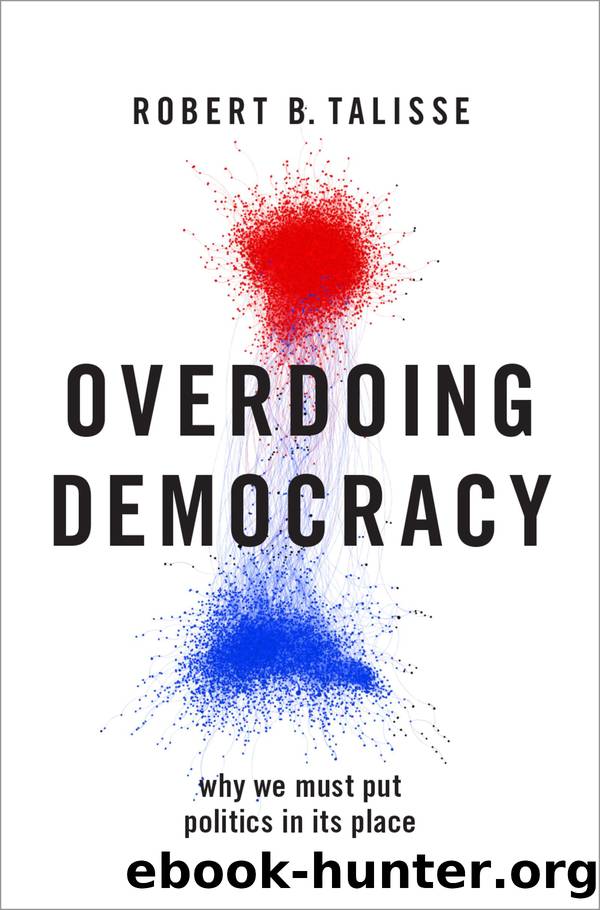Overdoing Democracy by Robert B Talisse

Author:Robert B Talisse [Talisse, Robert B]
Language: eng
Format: epub
ISBN: 9780190924201
Publisher: Oxford University Press
Published: 2019-01-15T00:00:00+00:00
4.3 Belief Polarization
Our analysis of belief polarization begins in what may seem to be unlikely places: the sports stadium and concert arena. Take a moment to recall the last time you watched your favorite professional sports team win an important game. Or, if sports arenât your thing, think for a moment of the last time you saw your favorite band perform an especially rousing concert. In attending the game or concert, you immersed yourself in a large group of fellow enthusiasts. Importantly, your immersion was not a matter of simply attending the same event as the other enthusiasts. Rather, in attending the event, you became a kind of participant in the group. For example, it is likely that you made an effort to dress like the others by donning a team jersey or a concert shirt; in any case, you sought to signal and express your membership in the group of devotees. And so you unreservedly rooted, applauded, and sang along with the others. In doing these things, you felt swells of excitement, elation, and perhaps even joy. Amidst all the cheering, you probably made some new friends as well. All the while your identification with that team or band was being reinforced. Moreover, in watching the team prevail or the band perform especially well, your mood was elevated. Finally, your estimation of the team membersâ or performersâ talents amplified. In the course of the performance, you came more firmly to hold that the team or band is truly excellent, and thus deserving of your commitment. In this way, the teamâs victory and the bandâs exhilarating performance were experienced as an affirmation of your identity as an enthusiast.
I take it that the description captures a familiar phenomenon, the experience of being a fan. What is important for our purposes is that when one joins a large group of others to watch a favorite team prevail or a beloved band perform especially well, one experiences a range of satisfying intensifications of mood and affect than in turn affirm oneâs sense of identity. This in part explains why fandom is so widespreadâbeing a fan generally feels good. More importantly, it also explains why stadiums and music venues are so often crowded; although the benefits that drive us to become fans are largely individual, the rush of being a fan is partly a collective phenomenonâit is enhanced in the presence of other fans. Hence even when we cannot attend the game or performance, we nonetheless devise ways to enjoy it with other fans. Perhaps this collective dimension also helps account for why when a home team loses an important game, the shared frustration and disappointment of the local fans can lead to violence. Fandom is a phenomenon by which we collectively provide to other fans an affirmation of their identity, and so the teamâs loss can be experienced as a personal affront. Even though thereâs no âIâ in âteam,â there certainly is a âMe.â
There are respects in which belief polarization mirrors the experience
Download
This site does not store any files on its server. We only index and link to content provided by other sites. Please contact the content providers to delete copyright contents if any and email us, we'll remove relevant links or contents immediately.
The remains of the day by Kazuo Ishiguro(8945)
Tools of Titans by Timothy Ferriss(8346)
Giovanni's Room by James Baldwin(7300)
The Black Swan by Nassim Nicholas Taleb(7086)
Inner Engineering: A Yogi's Guide to Joy by Sadhguru(6775)
The Way of Zen by Alan W. Watts(6575)
Asking the Right Questions: A Guide to Critical Thinking by M. Neil Browne & Stuart M. Keeley(5739)
The Power of Now: A Guide to Spiritual Enlightenment by Eckhart Tolle(5723)
The Six Wives Of Henry VIII (WOMEN IN HISTORY) by Fraser Antonia(5484)
Astrophysics for People in a Hurry by Neil DeGrasse Tyson(5169)
Housekeeping by Marilynne Robinson(4420)
12 Rules for Life by Jordan B. Peterson(4292)
Double Down (Diary of a Wimpy Kid Book 11) by Jeff Kinney(4252)
The Ethical Slut by Janet W. Hardy(4232)
Skin in the Game by Nassim Nicholas Taleb(4223)
Ikigai by Héctor García & Francesc Miralles(4219)
The Art of Happiness by The Dalai Lama(4114)
Skin in the Game: Hidden Asymmetries in Daily Life by Nassim Nicholas Taleb(3973)
Walking by Henry David Thoreau(3938)
